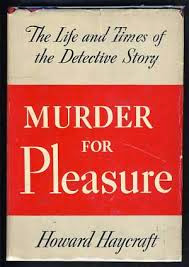By Howard Haycraft.
D. Appleton-Century Co.
1941. 409 pages. $3.00
Online HERE.
"It is not that there are too many bad detective novels published (there are, but that is beside the point), but that there are too many pretty good ones."
"Death by self-travesty is the most common occupational disease of the detectives of fiction, but it is not the only one."Here is a snippet from a book review which the critic uses to launch into an essay celebrating the centennial of the modern detective story. The book being reviewed is Haycraft's MURDER FOR PLEASURE, which for years was the standard reference text on the subject:
The top-notch mystery writers in their prime give you fiction in its purest form: story-telling for its own sake, characterization in terms of action and dialogue, as conventional in emotional values as an eighteenth century portrait but frequently comparable in subtlety, all set in a world of the imagination which exists for itself and not for its symbolical or ethical significance. If the absence of such significance means that detective fiction can never reach the level of serious fiction which is a 'criticism of life,' it also means that the best detective fiction seldom or never is marred by the false emotion or the dubious values which attach, if only in a left-handed way, to popular fiction in certain other categories.
It is in the rereadability of a detective novel that its chances for survival inhere. And for rereadability there must be more than an ingenious plot, more than a unique murder device. There have to be characters—whose society one enjoys with no feeling of obligation or responsibility—existing in a magnetic atmosphere. These qualities are prominent in even the weakest of the Conan Doyle stories; and only to a smaller degree than in Conan Doyle are they present in the best work of all the first-rank writers of detective fiction. This being the case, one feels confidence that the future of the detective story—allowing for the changes in fashion which Mr. Haycraft so discerningly traces—is going to be very much like the past. — George Stevens, "Death by Mis-adventure: Centennial of the Detective Story," The Saturday Review, October 18, 1941 (pages 6-7, 34-36)The entire review is well worth reading.
Resources:
- Its place in the "Haycraft-Queen Cornerstones, 1748-1952" list is HERE.
- An abridgement of Haycraft's chapter on Edgar Allan Poe is HERE.
- Much shorter reviews of Haycraft's THE ART OF THE MYSTERY STORY (1946) are HERE and HERE.
Category: Detective fiction


No comments:
Post a Comment